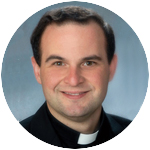
Father Eric J. Banecker
Saturday is the Solemnity of Saints Peter and Paul, those indispensable men who proclaimed the Gospel with great boldness after life-transforming encounters with the Risen Christ. This missionary impulse brought both of them to Rome – a few years apart – and ended with martyrdom in that city at the hands of the Roman authorities. To this day, when the Pope signs official correspondences with other bishops, he puts “P.P.” after his name, a reference to these apostles and martyrs who are essential to the apostolic foundations of the Church.
While each of them have their own feast days as well (The Chair of Saint Peter and the Conversion of Saint Paul), this Solemnity outranks those. And there is a certain irony to that. After all, Peter and Paul didn’t always get along so well. How do we know this? Well, Saint Paul basically tells us in the second chapter of his letter to the Galatians:
And when Cephas came to Antioch, I opposed him to his face because he clearly was wrong. For, until some people came from James, he used to eat with the Gentiles; but when they came, he began to draw back and separated himself, because he was afraid of the circumcised. And the rest of the Jews* [also] acted hypocritically along with him, with the result that even Barnabas was carried away by their hypocrisy. But when I saw that they were not on the right road in line with the truth of the gospel, I said to Cephas in front of all, “If you, though a Jew, are living like a Gentile and not like a Jew, how can you compel the Gentiles to live like Jews?”
The full context of this passage would take quite a long time to explain. But let’s boil it down to the basics: Paul, called by Christ himself to be the “apostle to the Gentiles” draws converts to Christianity who are not Jewish. Paul was a pharisaical Jew before his conversion, and Peter and the apostles were all Jewish. Therefore, this influx of non-Jews presented a theological and pastoral dilemma: do the Gentiles have to follow the Mosaic law in order to be Christian? This was not a question about the moral and ethical norms of the old law – these were meant to express elements of Divine and natural law which apply to all – but rather the cultic and purity laws. Must a man be circumcised in order to become Christian? Should Gentiles keep kosher? There were arguments about this among the early disciples, and those of various opinions fell into different factions (not much has changed!).
But in the end, the apostles decreed that they had discerned in the light of the Holy Spirit that Gentiles had no need to follow the ritual purity laws of the Old Testament in order to follow Christ. So far, so good, right? Well, it seems that Saint Peter was trying to play both sides of this issue – he would eat freely with Gentiles when no one was looking, but if some of those from the “Judaizing party” were around, Peter would suddenly become scrupulous about following the purity laws again, thus drawing back from the Gentile Christians.
For this reason, Saint Paul, not known for his shyness, gets right in Saint Peter’s face, “because he clearly was wrong.”
What lesson can we draw in our own time? First, we should know that our first duty as disciples of Jesus Christ is to help one another become saints. Pandering, flattery, and cowardice will get us nowhere in this. Jesus commands us to love one another as he has loved us. Jesus himself did not mince words when calling others to conversion. The urgency of the Kingdom of God is too great.
At the same time, Paul’s fraternal correction of Peter is precisely that – fraternal. It is based in charity for Peter himself and for the confused Gentile converts. Above all, Paul sees Peter’s consistency as essential not because he disrespects Peter, but because he is fully aware of Peter’s role as the principle and source of unity among the apostles, and the one to whom Jesus gave the keys to the Kingdom of heaven.
That’s how it is for us Catholic Christians. Though we come from different backgrounds and have different personalities and perspectives on life, the great unifying factor is that decisive encounter with the Risen Christ, who calls us to respond to his love on earth and share in his glory forever in heaven. For these two men, that encounter came in the form of questions: “Saul, Saul, why are you persecuting me?” “Who do you say that I am?,” “Simon, Son of John, do you love me more than these?” Their answers came through the manner of their life: by embracing the great adventure of discipleship and mission which led them to places they never would have chosen to go, including to Rome where they gave the ultimate witness to the fact that Christ is Risen indeed. May we ask for their intercession and pray that God will send laborers like them into the world in our time.
***
Father Eric J. Banecker is pastor of Saint Mary Magdalen Parish in Media, Delaware County.


Share this story